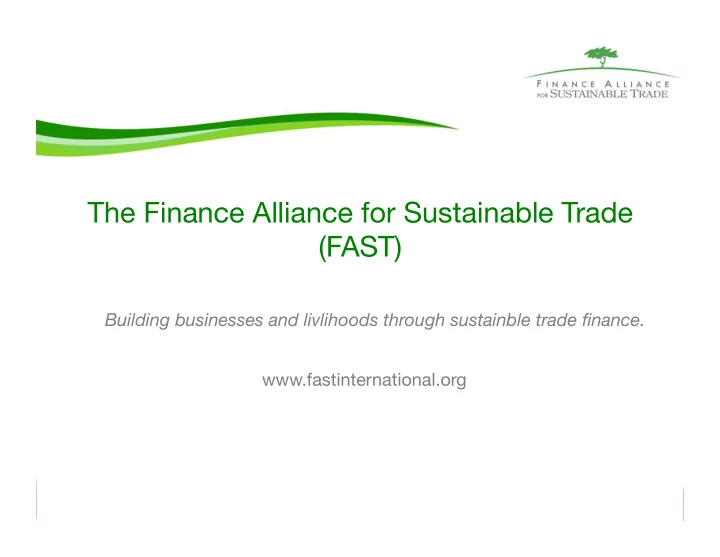

The Finance Alliance for Sustainable Trade (FAST) Building businesses and livlihoods through sustainble trade finance. www.fastinternational.org
About FAST: Our Goals FAST promotes the growth of production and trade in sustainable agricultural sectors worldwide by increasing the number of Small and Medium Enterprises (SMEs) who can successfully access quality finance . FAST facilitates efficiency, transparency, and stability in financial markets for sustainable SMEs by providing objective data to lenders, while developing and promoting reporting and quality standards. FAST includes the full range of stakeholders in sustainable agriculture including socially oriented financial institutions, NGOs, technical assistance providers, certification bodies, export agencies, and producers and their cooperatives.
About FAST: FAST Membership ● Total Membership: 152 members ● 32 Countries Represented ● Representative Members:
Problem Addressed: � Overcoming Barriers to Access Finance One of the challenges facing producers and producer cooperatives is an inability to invest in the needed infrastructure so that their businesses can increase yields, increase employment, achieve stability and sustainability, and access new markets. Access to finance is extremely difficult for more marginalized commodity producers, who may be turned down by banks at the local level and face multiple barriers relating to location, language and business structure. FAST has developed tools and a methodology to overcome those barriers, working with member financial institutions committed to providing more favourable access to finance for SMEs. FAST supports these financial institutions in making informed, responsbile choices about expanding and diversifying their portfolios.
Member Services: � Components of FAST’s Activities Sustainable Financial SME Market Trends Investment and Opportunities Performance Data Sustainable Impact Products Reporting Markets For the purposes of this presentation, we will focus only on the first quadrant, the SME Investment Opportunities
FAST Access to Finance Strategy: � Tools and Methodology � • FAST Financial Fairs (FFF): An FFF consists of a set of strategic one-on-one meetings between pre- selected SMEs and socially-oriented financial service providers. In these meetings, SMEs present their investment cases and financial documentation to selected financial institutions. To date, $38 million USD has been facilitated through FFFs, $17 million of which has been in the sustainable forestry sector. • The Online Financial Marketplace: The online database of financial service providers that facilitates the match-making process of the FFFs. • Financial Literacy Toolbox: Training materials specifically for agricultral SMEs on financial themes. • FAST Network of Consultants: On-the-ground financial literacy coaches for SMEs.
FAST Access to Finance Stategy: � Activity Plan � I. Identifying the target group and data gathering – SMEs in sustainable commodity sectors e.g. Coffee, cocoa, grains, oils, cotton, sugar, fruits and vegetables, forest products – Most often cooperatives, rather than individual producers, seeking working capital and short- or medium-term credit of $250,000 to $2 million USD. II. Increasing SME credit readiness – Network of Consultants – Financial literacy toolbox (FLTBX) III. Linking supply and demand – FAST Financial Fair IV. Follow-up – Network of Consultants
FAST Access to Finance Strategy: � Scaling Up � • FAST currently operates an online platform that showcases information about FAST members that are financial service providers. This helps SMEs find the right financing based on region, amount, duration and sector. This is also a match-making tool deployed in the Financial Fairs. • In 2015, FAST will scale up the online platform to enable SMEs to upload their information so that it can be matched with financial institutions, radically increasing the accessibility and efficiency of FAST’s matchmkaing services, as well as lowering the transaction costs .
SME Investment in Africa: � Challenges Agricultural commodity producers in Africa face numerous barriers to access finance including: • Producers often lack the business education necessary to present their businesses to financial institutions • There is a lower tendency among producers to be associated or aggregated into larger units to receive finance • Producers have lower market access due to quality, regulatory and logistical issues • Many producers speak their local languages only • Financial institutions frequently lack adequate financial products to serve this group
SME Investment in Africa: � Solutions • Increasing access to finance for sustainable SMEs has the potential to both drive economic development and address critical food security issues . • In order to increase the long-term commitment of financial institutions to invest in these enterprises, partnerships must be formed in the name of producing data that they can use to make informed investment choices and creating frameworks in which investment can take place. • Building the capacity of producers via financial coaching by those who speak the local language and tools that guide them through accessing finance is a crucial component to increasing investment.
Thank You For more information, please contact: Serena Thomson International Relations Officer Tel: +1 514 759 6626 serena.thomson@fastinternational.org www.fastinternational.org AND Ragnar Wetterblad Tel: +41 79 342 01 93 ragnar@cafe-volcan.com www.gctrading.ch
Recommend
More recommend